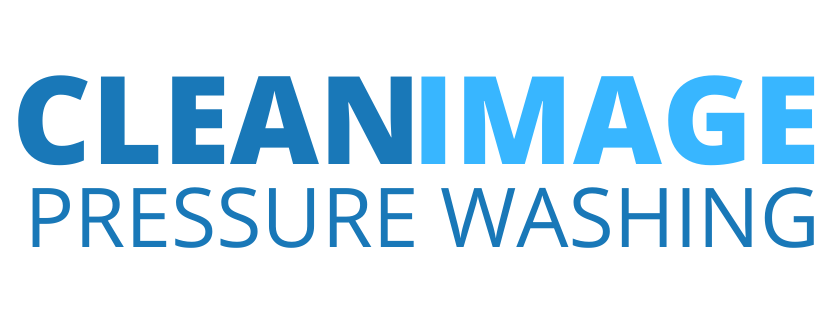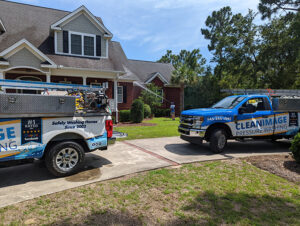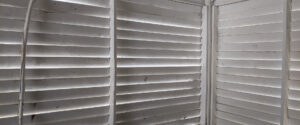Power Washing Vs Pressure Washing: Which One is Right for You?
When it comes to keeping your property clean and well-maintained, the battle between power washing and pressure washing can be intense, much like the grime they combat. Appropriate cleaning of decks, driveways, and home exteriors can transform not just the appearance of your residence or commercial building, but also its lifespan. Understanding the nuances between power washing vs pressure washing is critical to choosing the method that suits your needs best. In this comprehensive blog post, we will dissect the differences between these two cleaning powerhouses, address which should be wielded under certain circumstances, and guide homeowners, DIY enthusiasts, and property managers in making an informed decision.
Understanding Power Washing
Power washing is a cleaning method that uses high-pressure water to remove dirt, grime, mold, and other stubborn substances from surfaces. Unlike pressure washing, it also incorporates the use of heated water, which is effective in killing weeds and moss and removing more stubborn stains like oil and grease. The equipment used in power washing includes a high-pressure hose connected to a motor that heats the water and propels it through the nozzle at a high velocity.
The main difference between power washing and pressure washing lies in the temperature of the water. Power washing uses hot water to enhance the cleaning process, making it particularly effective for tackling tough stains and substances that require more than just high pressure to be removed. This method is especially beneficial for surfaces that are heavily soiled and can withstand the combination of high pressure and high temperature.
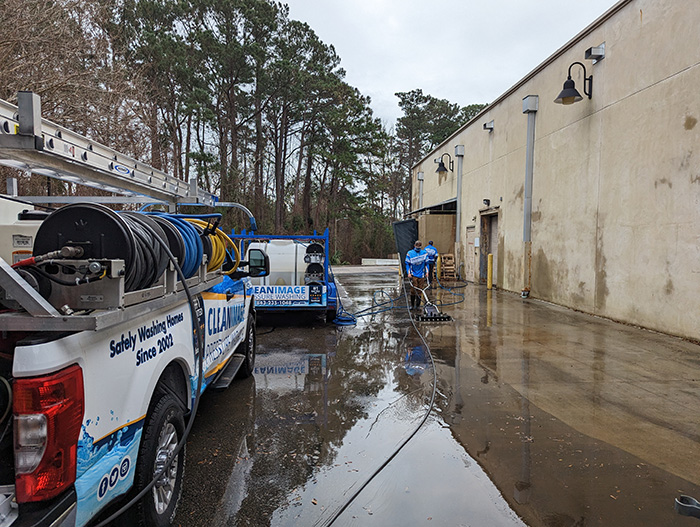
Uses and Benefits
Power washing is ideal for cleaning large areas such as driveways, patios, decks, and the exterior of buildings. The heated water not only cleans more effectively but also sanitizes surfaces, making it an excellent choice for areas that might be contaminated with mold or mildew. Power washing is also beneficial in preparing surfaces for painting or staining, as it ensures that the surface is thoroughly clean and free of debris. Homeowners and property managers opt for power washing due to its efficacy in enhancing the appearance and longevity of their property, reducing the need for frequent repairs and maintenance.
Understanding Pressure Washing
Pressure washing, akin to power washing, employs the force of high-pressure water to remove dirt, algae, and other materials from outdoor surfaces. However, unlike its counterpart, pressure washing does not utilize heated water. This method involves a motorized pump to pressurize water from a hose, then blasts it through a nozzle towards the targeted surface, effectively stripping away unwanted substances without the aid of high temperatures.
While pressure washing may not have the added benefit of hot water, it is nonetheless highly effective for a wide variety of cleaning tasks. It is particularly suited for materials and surfaces that might be damaged by the high temperatures used in power washing, such as softer wood, certain types of siding, and surfaces painted with a water-soluble paint. Pressure washing is frequently utilized for residential homes, vehicles, and outdoor furniture, making it a versatile option for regular maintenance and cleaning operations. Its efficacy lies not only in the ability to clean surfaces but also in its capacity to do so without the risk of heat damage, preserving the integrity and appearance of your property.
When to Use Power Washing
Power washing is the preferred method when dealing with extremely tough stains and buildups, such as grease, oil, moss, and mold that refuse to budge under normal cleaning methods. It’s especially effective for cleaning hard surfaces that can withstand high temperatures and pressures, such as concrete driveways, stone pathways, and brick exteriors. Given its ability to not only clean but also sanitize surfaces, power washing is an excellent choice for areas that require a deep clean due to contamination from bacteria or other hazardous materials.
This cleaning technique is also invaluable when preparing for a painting or staining project. The combination of high pressure and hot water ensures that all remnants of old paint, mold, mildew, and other debris are entirely removed, providing a pristine surface for new applications. Additionally, for commercial properties or homes in environments prone to heavy pollution or natural growth due to moisture, power washing at regular intervals can significantly reduce wear and tear, extending the lifespan of the building’s exterior surfaces.
Power washing should be used judiciously, considering the nature of the surface and any specific cleaning requirements. It is the go-to solution when an ordinary cleaning won’t suffice and you need a powerful method to restore the look and hygiene of your property.
When to Use Pressure Washing
Pressure washing is best employed for regular maintenance cleaning and is ideal for surfaces that are sensitive to high temperatures. It is the method of choice for cleaning siding, especially vinyl, aluminum, and some types of wood siding that might warp under the heat of power washing. Additionally, it’s suitable for washing vehicles, such as cars, boats, and trailers, where high temperatures could damage paint or decals.
Residential properties often benefit from pressure washing for the removal of mild dirt accumulation, algae, and mold from patios, decks, and outdoor furniture, protecting these surfaces without the intensity of heat. It’s also effective for cleaning fences, gutters, and other areas that do not require a deeper clean. For those concerned about the environmental impact, pressure washing can be a more eco-friendly option, as it typically consumes less water due to the absence of a need to heat the water.
Leveraging pressure washing annually or bi-annually as a part of property upkeep can significantly enhance curb appeal, prevent the build-up of harmful substances, and maintain the property’s value without risking damage to heat-sensitive surfaces. It’s a practical, cost-effective, and safe cleaning method for a wide array of applications, ensuring your property remains in pristine condition year-round.
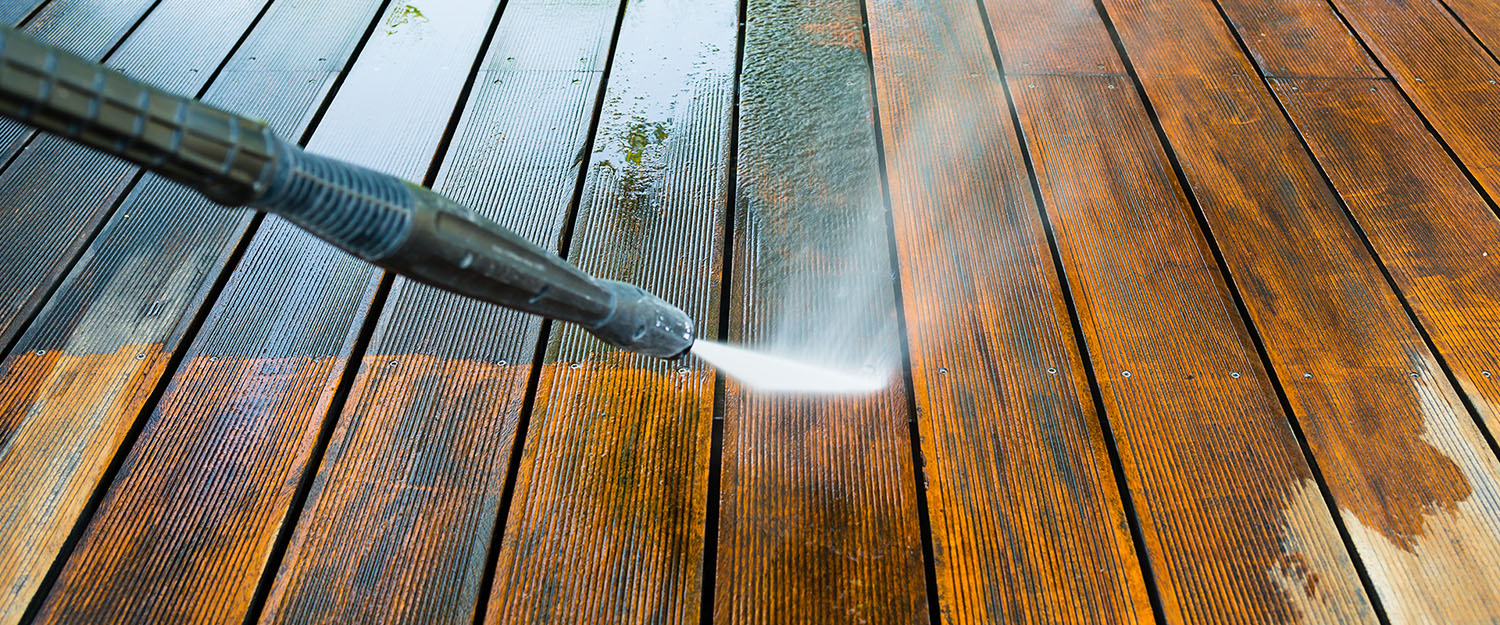
Choosing the Best Method for Your Needs
Deciding between power washing and pressure washing depends on the specific needs of your property and the surfaces you aim to clean. If dealing with extremely tough stains, greasy buildups, or surfaces contaminated by mold and mildew, power washing may be the right choice for you. Its use of hot water makes it particularly effective for deep cleaning and sanitizing hard surfaces like concrete, stone, and brick. On the other hand, for regular maintenance cleaning of more delicate surfaces, such as vinyl siding, wooden decks, or painted items that might be damaged by high heat, pressure washing is more suitable. It offers a gentle yet effective cleaning solution that preserves the integrity of the surface.
When choosing the best method, consider the material of the surface, the type of dirt or stains present, and the level of cleaning required. For surfaces that are sensitive to high temperatures or for those looking for a more eco-friendly option, pressure washing should be the go-to method. However, for intensive cleaning tasks where heat can aid in the removal of stubborn grime, opting for power washing can yield superior results.
Ultimately, the decision should be made based on a thorough assessment of your cleaning needs, taking into account the durability of the surfaces involved and the specific challenges posed by the dirt or debris. Whichever method you choose, both power washing and pressure washing are effective ways to enhance the appearance and longevity of your property.
DIY vs Hiring a Professional
Deciding between a DIY approach and hiring a professional for power or pressure washing can hinge on several factors, including cost, time, and the complexity of the project. For those who are handy and have access to the necessary equipment, undertaking this task themselves can be a cost-effective solution. It offers the flexibility to work at one’s own pace and the satisfaction of personally maintaining the property. However, it’s essential to be aware of the learning curve and the risks involved, including potential injury or damage to your property if the equipment is not used correctly.
On the other hand, hiring a professional comes with the assurance of experience and expertise. Professional cleaners possess the knowledge to choose the right method for your property, whether it’s power washing or pressure washing, and can efficiently handle complex cleaning tasks. They are also equipped with commercial-grade equipment that might be more effective than consumer models. While hiring a professional may come at a higher cost compared to doing it yourself, the safety, efficiency, and peace of mind they offer can be worth the investment. Plus, professionals are typically insured, which provides additional security in case of accidental damage.
Ultimately, the choice between DIY and hiring a professional depends on personal preference, the scale of the project, and one’s comfort level with the equipment. For small, manageable tasks, a DIY approach might be sufficient. However, for larger, more complex projects, or when dealing with particularly stubborn stains or delicate surfaces, the expertise of a professional can ensure the job is done safely and effectively, preserving the condition and appearance of your property.
https://www.google.com/maps?cid=11141334835103329286
